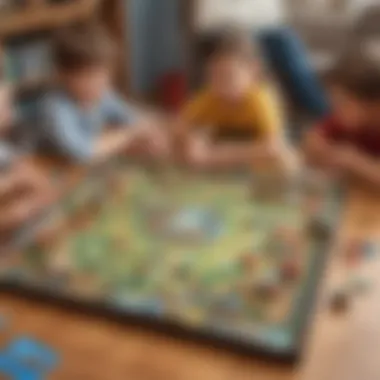Top Homeschool Games to Boost Learning Experience


Intro
In an increasingly dynamic educational landscape, the importance of innovative learning methods cannot be overstated. Homeschooling provides a unique opportunity for parents and educators to tailor educational experiences, allowing for a personalized approach. A powerful strategy within this framework is the incorporation of interactive learning games. These tools not only foster academic skills but also nurture critical thinking, creativity, and collaboration among children.
This article takes a comprehensive look at some of the best homeschool games available, specifically designed for children aged three to twelve. By exploring various categories—from board games to digital activities and outdoor challenges—we aim to highlight the significant role that games can play in enhancing learning. By reading this guide, parents, educators, and caregivers can discover effective strategies and resources that will enrich the educational journey for their children.
Understanding the Role of Games in Homeschooling
Games play a pivotal role in the homeschooling experience. They are not just recreational activities, but tools that facilitate significant learning. By integrating games into the curriculum, parents and educators can create an engaging and interactive environment conducive to critical learning. Children learn best when they are actively participating, and games offer this participation in a way that traditional methods sometimes fail to achieve.
The Educational Value of Games
Promoting Critical Thinking
Critical thinking is an essential skill for children as it lays the foundation for lifelong learning. Through games, children can encounter various scenarios requiring them to analyze information and make decisions. This promotes independent thought. One key characteristic of critical-thinking games is their reliance on logic rather than memorization. They challenge players to think ahead and predict outcomes, making them popular in educational settings. However, it is essential to choose games that are appropriately challenging; too easy or too hard can lead to disengagement, which detracts from their educational purpose.
Encouraging Collaboration
Collaboration is an increasingly necessary skill in today's interconnected world. Games that require teamwork help children learn how to communicate, share ideas, and develop social skills. The key aspect of collaborative games is that they foster relationships among peers, teaching children the value of working together toward common goals. These games can create a sense of belonging and cooperation, which can be beneficial in a homeschooling environment. One disadvantage, however, is that some children may struggle to work in teams, leading to frustration if not properly guided.
Enhancing Problem-Solving Skills
Problem-solving is another critical aspect of education that games can effectively cultivate. When children face challenges in a game setting, they must find solutions independently or as a group. This skill translates well into academic settings and real-life situations. A notable feature of problem-solving games is their unpredictable nature, requiring players to adapt to new obstacles and outcomes. While engaging, it's important to note that not every child may thrive in this setting immediately. Some may require more support or structured approaches to solve problems effectively.
Engagement Through Play
The Importance of Fun
Fun is a crucial factor in the learning process. When children enjoy what they are doing, they are often more engaged and willing to learn. Games that incorporate elements of fun can lead to greater creativity and enthusiasm for subjects. A significant characteristic of fun-oriented learning is that it often leads to increased retention of information. However, the challenge lies in ensuring that the fun aspect does not overshadow the educational goal. Balancing entertainment with learning is necessary to maximize effectiveness.
Maintaining Attention and Focus
In a homeschooling setting, maintaining a child's attention is critical for effective learning. Games inherently draw attention through their engaging nature. The key characteristic of games that help maintain focus is their dynamic structure, which keeps children challenged and entertained. This can lead to longer periods of engagement compared to traditional methods. Nevertheless, parents must be cautious about over-reliance on games, as too much game time can lead to distractions from other important learning activities.
Types of Homeschool Games
Understanding the types of homeschool games is crucial for enhancing the educational experience for children. Games can provide varying levels of engagement, promoting learning in a fun and interactive manner. They can cover a wide array of subjects, making them versatile tools in a homeschooling environment. Each type of game offers unique benefits and considerations that can align with the educational goals set by parents or educators.
Board Games
Strategy Games
Strategy games focus on planning and decision-making. They require players to think critically and consider their moves carefully. This kind of game helps children develop strategic thinking skills, which are essential in everyday problem-solving. Popular strategy games, like Catan or Ticket to Ride, involve resource management and promote foresight. The key characteristic of strategy games is their emphasis on logical reasoning. This makes them a beneficial choice for teaching children how to assess situations and weigh options. However, some children may find the complexity of certain strategy games challenging, leading to frustration rather than learning.
Word and Trivia Games
Word and trivia games focus on vocabulary and general knowledge. Games like Scrabble or Trivial Pursuit engage children in language arts, promoting literacy and retention of information. These games require players to think quickly and recall facts. The key characteristic here is the fun element that accompanies learning new words and facts. They are a popular option as they can cater to different age levels and knowledge bases. One disadvantage might be that if a child struggles with reading, these games could be discouraging.
Math-focused Games
Math-focused games are designed to enhance numerical understanding and reinforce mathematical concepts. Games like Sum Swamp or Zingo! 1-2-3 provide hands-on learning opportunities. They can develop skills in addition, subtraction, and even basic problem-solving. The key characteristic of these games is their ability to make math enjoyable. This is a beneficial choice as it helps alleviate math anxiety by introducing fun elements. However, they can sometimes be less engaging for children who may find traditional math practice dull.


Digital Learning Games
Interactive Educational Platforms
Interactive educational platforms offer a variety of games designed to support learning across different subjects. Websites like Khan Academy or Starfall combine play with educational content, making learning accessible and diverse. The key characteristic is their flexibility, allowing children to learn at their own pace. This makes them a beneficial option for homeschooling. While these platforms are engaging, some might argue there is a risk of children spending excessive time on screens, which needs monitoring.
Mobile Apps for Learning
Mobile apps for learning provide on-the-go educational experiences. Apps like Duolingo for languages or Prodigy for math are designed to make learning interactive and fun. The key characteristic is their accessibility and convenience. Parents can easily integrate these into daily routines. This makes them a beneficial choice since learning can happen anywhere. One downside can be the subscription fees for premium features, which can add up over time.
Video Games with Educational Value
Video games that offer educational value, such as Minecraft: Education Edition, allow children to explore complex concepts within an immersive environment. These games often blend academic learning with creative expression. The key characteristic is their ability to engage students through storytelling and interactivity. This makes them a popular choice among learners. However, parents should be mindful of screen time and ensure the games are appropriate for their educational goals.
Outdoor and Physical Games
Nature-based Educational Activities
Nature-based educational activities encourage exploration and can be integrated into outdoor learning. Games that involve scavenger hunts or nature walks can teach children about ecology and the environment. The key characteristic is the hands-on experience children receive, promoting physical activity along with learning. This is a beneficial approach as it engages multiple senses. However, weather dependency can limit these activities, making planning essential.
Physical Team-building Games
Physical team-building games encourage teamwork and communication skills. Activities such as relay races or cooperative games provide a fun way to learn social skills and camaraderie. The key characteristic is the focus on collaboration. This type of game is a beneficial choice because it helps children practice working together toward a common goal. The disadvantage may be the potential for competitiveness to overshadow the cooperative aspect.
Exploration and Discovery Games
Exploration and discovery games inspire curiosity in children. Activities like geocaching or nature exploration foster a sense of adventure. They teach children to ask questions and seek answers. The key characteristic is the encouragement of independent learning. This makes them a popular option for those wanting to ignite a passion for discovery. However, these games often require supervision, which parents need to consider.
Selecting the Right Games
Selecting the right games for homeschooling is a crucial step in creating an effective learning environment. The games chosen can influence a child’s educational journey by aligning with learning goals and promoting essential skills. Understanding how to pick games not only enhances the educational value but also ensures that the time spent playing is both enjoyable and productive.
Assessing Educational Goals
Aligning with Curriculum Subjects
Aligning games with curriculum subjects means choosing games that reinforce the academic topics being taught. This approach enhances learning, as children can see the connection between play and education. When games reflect particular subjects, they can deepen understanding and retention. For example, a game that focuses on historical events can make history more tangible. This integration makes learning feel relevant and applicable.
A key characteristic of aligning with curriculum subjects is its ability to introduce complex concepts in an engaging way. For this article, it is a beneficial choice because it transforms traditional learning into an interactive experience. The unique feature of this alignment allows children to apply what they learn in a fun setting, helping solidify these concepts.
However, care must be taken that the games are not overly simplistic. If they lack depth, they may fail to provide adequate stimulation. Balancing fun and educational content is essential.
Identifying Skill Development Opportunities
Identifying skill development opportunities within games highlights how play can enhance various competencies like critical thinking or creativity. This aspect can significantly contribute to the overall educational goals by focusing on specific skills targeted during play. Parents and educators can look for games that nurture these skills, thus transforming playtime into an effective learning session.
The focus on skill development makes it a popular choice for families looking to maximize educational outcomes. Unique features of such games often include challenges that adjust to a child’s skill level, fostering independence and problem-solving. The advantage here lies in the ability to customize learning according to individual needs, making it highly effective.
Nonetheless, it might be challenging to find games that address every child’s developmental stage. While it is vital to consider games that promote skills, they should also remain enjoyable and accessible.
Age Appropriateness
Games for Early Learners


Choosing games for early learners is vital, as this age range, typically 3-5 years old, is crucial for foundational skills. Games designed for them often include basic math, vocabulary building, and critical thinking. These games not only cater to early development stages but also keep children engaged in meaningful play.
A significant aspect of games for early learners is the combination of fun and education. This balance provides a strong foundation for future learning. Such games often feature colorful designs and simple instructions, which are appealing to young children. Their unique feature is the ability to create a playful atmosphere that invites exploration and curiosity.
However, challenges may arise if games are too advanced or complex, which can lead to frustration. Ensuring that these games are age-appropriate is essential to maintain interest and encourage learning.
Suitable Choices for Middle Childhood
For children aged 6-12, suitable game choices can greatly influence how they engage with learning. This age group is often ready for more complex strategies and deeper learning experiences. Games that focus on logic, problem-solving, and teamwork can be highly beneficial.
A prominent characteristic of games suitable for this age range is their capacity to blend learning with engaging narratives. Children can immerse in more complex scenarios which promote creativity and analytical thinking. This attribute makes such games a great choice for this article, appealing to growing minds eager to explore.
The unique feature here is the potential for collaboration among peers, enhancing social skills alongside academic learning. Nevertheless, it is important to ensure that these games still offer a manageable challenge. Games that are overly difficult may deter engagement and discourage participants from continuing.
Implementing Games in a Homeschool Setting
Implementing games in a homeschool setting plays a significant role in educational development. Games can transform traditional learning into engaging experiences. The incorporation of games enhances fundamental skills such as problem-solving, critical thinking, and teamwork. Furthermore, games make learning enjoyable, fostering a lifelong love for education among children. Parents often seek methods to integrate play into their teaching, which can lead to improved retention and understanding of complex concepts.
Scheduling Game Time
Incorporating Into Daily Routines
Incorporating games into daily routines is essential for maximizing learning opportunities. By establishing a dedicated time for games, children learn to associate educational activities with fun. This structure allows for more predictable learning experiences. Children might develop better discipline, knowing they have time set aside for play. A typical schedule might include an hour of game time after math lessons. This can reinforce skills learned in the classroom while providing a break from more intense study sessions.
However, strict adherence to a schedule may have downsides. Kids may feel pressured if game time is too structured. Balancing flexibility with routine could be a better choice. While consistency is vital, occasional variations can maintain enthusiasm.
Balancing With Other Learning Activities
Balancing game time with other learning activities is crucial for holistic education. Games serve as a compliment to also traditional learning methods, helping reinforce topics such as history or geography through playful means. A balanced schedule can make the learning process more dynamic. It also allows kids to explore various subjects without feeling overwhelmed by constant academic demands.
On the other hand, an imbalance where games dominate can lead to neglect of essential study subjects. Parents must monitor this to ensure all areas are covered adequately. It's wise to set clear guidelines on when and how long games are played.
Integrating Games with Subjects
Combining Games with Science Lessons
Combining games with science lessons enriches the educational experience. Creative game designs that incorporate scientific principles make abstract concepts more tangible. For example, games focusing on the water cycle can help children better grasp natural processes. Additionally, these games can be structured to facilitate group participation, enhancing teamwork and communication skills.
This integration can be beneficial not only for learning but also for sparking interest in science topics. However, educators and parents should assess if the game aligns with curriculum goals. Not all games will provide the depth of understanding required, so careful selection is critical.
Using Games in Language Arts
Using games in language arts fosters literacy in an engaging way. Games that challenge spelling, vocabulary, or comprehension can stimulate interest. For instance, Scrabble can enhance word recognition, while storytelling games promote creativity in writing. This interactive approach tends to attract reluctant readers and writers, capturing their attention in a relaxed setting.
Yet, it is important to ensure that games are not too simplistic. They should challenge children enough to foster growth in language skills. Additionally, parents need to guide the process to connect game experiences back to more formal learning aspects.
Evaluating Game Effectiveness
Evaluating the effectiveness of games in homeschooling is crucial for understanding how well they meet educational objectives. This step allows parents and educators to assess not only if the games enhance learning but also if they align with the specific needs of the child. By systematically evaluating game effectiveness, one can ensure that the chosen games contribute positively to the educational journey.
Observing Skill Development
Tracking Progress


Tracking progress involves monitoring the skills and knowledge children gain while playing educational games. This process is essential for determining the effectiveness of any homeschooling strategy. The key characteristic of tracking progress is that it provides measurable data on a child's development.
It allows parents to see trends in learning and identify areas where a child may excel or struggle. This approach is beneficial because it promotes accountability. If a game is proving effective, parents can continue using it; otherwise, they can consider alternatives.
The unique feature of tracking progress is the ability to document progress over time. This data can help in tailoring education to better fit a child's evolving needs. On the downside, excessively focusing on progress can sometimes pressure children, possibly reducing their enjoyment of gameplay. The balance between fun and learning should always be maintained.
Identifying Areas for Improvement
Identifying areas for improvement helps in fine-tuning the educational experience. This aspect focuses on recognizing gaps in knowledge or skills and is crucial for setting new goals. The key characteristic of this approach is its proactive nature; it encourages constant learning and adaptation.
The rationale behind this strategy is that understanding weaknesses allows for targeted interventions. This identification process is popular in educational settings because it emphasizes growth and development. The unique feature here lies in creating personalized plans, which can greatly benefit children who learn at different paces. However, an overemphasis on areas for improvement can lead to frustration or disengagement; it’s essential to balance this with recognition of achievements.
Feedback from Children
Understanding Engagement Levels
Understanding engagement levels is fundamental to assessing how well children connect with educational games. This aspect involves gathering information about how absorbed and interested children are in the gameplay. The key characteristic of this evaluation method is that it centers on the child's perspective, making it exceptionally insightful.
Engagement is essential for effective learning. If children are engaged, they are more likely to retain information and develop skills. This approach works well in homeschool settings where child-led learning can thrive. A unique feature of this feedback method is its adaptability; when children express preferences, educators can adjust the games accordingly. However, children’s feedback can sometimes be inconsistent, making it challenging to draw solid conclusions.
Adapting Based on Interests
Adapting based on interests is about tailoring educational experiences to align with what children find enjoyable. This method fosters a more personalized learning environment, making it highly valuable. The key characteristic of this strategy is its focus on the child's preferences, ensuring that the chosen games resonate with them.
Engaging children in this way can lead to better learning outcomes and increase motivation. This approach is effective because it considers the individual's likes and dislikes, facilitating a more joyful learning process. The unique feature here is the potential for creativity in education; games can be modified or new ones introduced based on interests. While it poses the challenge of frequent changes in game choices, it often outweighs any drawbacks when children are more enthusiastic about learning.
Resources for Finding Homeschool Games
Finding the right resources for homeschool games is crucial for enhancing a child's learning experience. Parents and educators often face the challenge of sifting through myriad options available in the market. This section explores various resources that can lead to effective and fun learning games. By considering these resources, one can find games that align with educational goals while also capturing children's interest.
Online Educational Platforms
Websites Offering Game Resources
Websites that offer game resources are invaluable in today's digital age. They provide a wide range of educational games designed for different age groups and subjects. These platforms usually have filtering options, allowing users to search for games based on specific learning goals. This specificity is a key characteristic, making them a popular choice among homeschooling families.
One unique feature of these websites is user reviews. They often contain feedback from other parents and educators, which can guide new users when selecting suitable games. Such insights can clarify a game's educational value and engagement level. However, it is crucial to consider that not all websites are equally reliable. Some may lack comprehensive reviews or might focus on less effective games.
Subscription-based Game Services
Subscription-based game services offer a different approach. They typically provide a curated collection of games that are regularly updated. This keeps the content fresh and engaging for children. A major advantage of these services is the convenience of access to a vast library of educational games at a fixed price.
The key characteristic of subscription services is their comprehensive packages. Subscribers often receive additional resources such as lesson plans and progress tracking tools. One disadvantage, however, could be the recurring cost, which some may find burdensome depending on their budget. Therefore, it becomes important to evaluate whether the offered games justify the subscription fee before committing to such a service.
Community Recommendations
Parent and Teacher Forums
Parent and teacher forums are wonderful sources for discovering homeschool games. These online communities allow for the exchange of experiences and recommendations among users. The collaborative spirit of forums helps in finding games that have been tried and tested by other families.
One major benefit of forums is the diversity of opinions. Users often share insights about games that worked well for their children along with those that did not. However, a downside could be the overwhelming amount of information provided, which can make it difficult to discern the best options. Despite this, the shared experiences can be very helpful in making informed decisions.
Social Media Groups
Social media groups also serve as a rich resource for locating effective homeschool games. These groups bring together parents, educators, and caregivers to discuss various strategies, including game selection. A key advantage is the immediacy of feedback; one can ask questions and receive responses in real-time from a community of experienced individuals.
Social media's reach can help in accessing a broader range of suggestions. Yet, the quality of recommendations can vary widely since not all users have the same level of expertise. This variability requires participants to exercise discernment when evaluating suggestions.
In summary, using online platforms and community recommendations can greatly enrich the search for effective homeschool games. By engaging with these resources, parents can enhance their children's learning experience through carefully chosen educational games.















